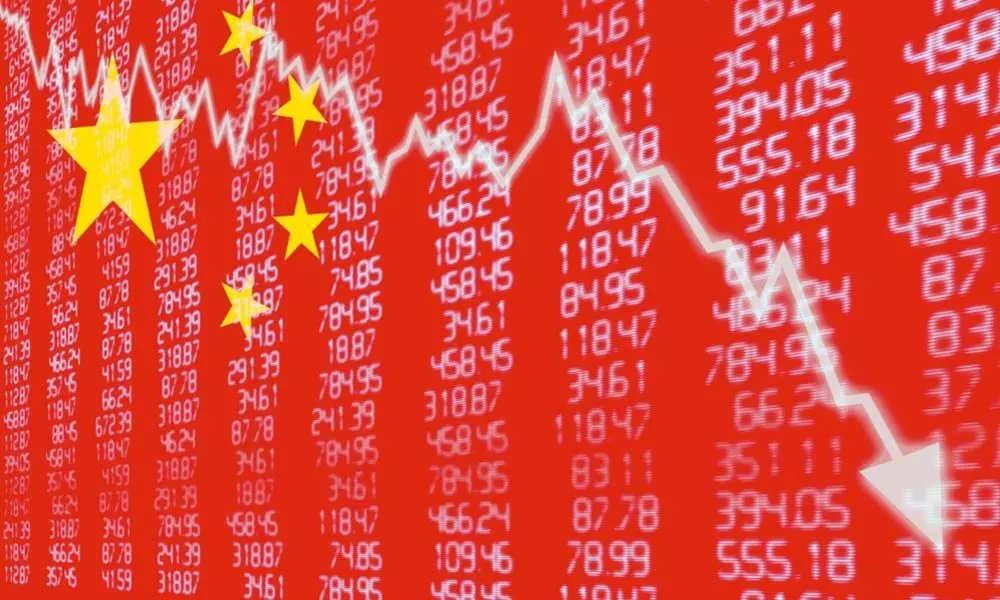The real taper tantrum should be happening in China
Perhaps the real tapering the world ought to worry about is happening in China. With hale growth rates, Beijing can do its part to lift Asia and buttress the world. As economic expansion resumed last year, the country sucked in imports from around the region, helping neighbours like Singapore put a floor under their local recessions
image for illustrative purpose

For all the concern that the US economic recovery from the pandemic will run too hot, an equally big risk may be that China's aspirations are too modest.
Premier Li Keqiang unveiled a growth target Friday of 'over 6 per cent' for this year, much slower than many economists' predictions. China's fiscal expansion will be pruned, with the budget deficit projected to be around 3.2 per cent of gross domestic product, down from more than 3.6 per cent in 2020. Quotas on bond sales by provincial governments have been trimmed.
By low-balling the goal for economic expansion this year, China is signalling that the heavy lifting is behind it. After becoming the only major economy in the world to notch any growth at all last year, Communist leaders want to worry about the quality rather than velocity of activity. Beijing's best course of action would have been to skip a numeric target altogether, as it did last year. Having one so low that it can be easily surpassed may be the next best thing.
Chinese officials don't have to spend their heart out to meet 6 per cent - the economy could slow markedly and still achieve this target. The International Monetary Fund projects an expansion of about 8 per cent, as do many private sector forecasters. Trade figures released Sunday show demand for Chinese products is booming. Exports surged in the first two months of 2021, up 60.6 per cent from a year earlier and well above forecasts. Imports also grew strongly. While it's a stretch to say China has moved past the pandemic, data show the year began with commercial vigour. With progress this good, reeling back some of the stimulus unleashed in the teeth of Covid-19 might seem like a reasonable idea. Li didn't signal any abrupt shift in policy direction, but it's clear he is intent on doing less rather than more.
In this regard, Beijing and Washington appear to have learned opposite lessons from the global financial crisis. In response to the 2007-2009 slump China went on an infrastructure binge. That helped revive growth domestically and, by extension, in the rest of the world. Yet the spree left state-owned enterprises with a big debt hangover, and policy makers in recent years have tried to discourage excessive borrowing and financial imbalances. Though that approach had to be tempered amid the pandemic, Li's numbers Friday look like a conservative stance is back.
US officials, meanwhile, appear to have concluded they weren't bold enough post-crisis and withdrew too quickly. Bond investors are now testing the Federal Reserve and President Joe Biden: Yields have climbed in recent weeks, reflecting concern the recovery will gather too much momentum and spark inflation. According to the latest Bloomberg monthly survey of economists, GDP will gain 5.5 per cent this year - the best since 1984, when President Ronald Reagan's 'Morning in America' campaign championed a commercial comeback from the patchiness of the 1970s and early 1980s. The $1.9 trillion stimulus bill that passed the Senate over the weekend was the second-largest such package in US history; growth of 7 per cent by year-end is conceivable.
The past few weeks have been cluttered with references to the so-called taper tantrum in 2013, as I've written. Perhaps the real tapering the world ought to worry about is happening in China. With hale growth rates, Beijing can do its part to lift Asia and buttress the world. As economic expansion resumed last year, the country sucked in imports from around the region, helping neighbours like Singapore put a floor under their local recessions.
But this doesn't look like a China that's itching to carry the world, certainly not at its own expense. Given the hoopla around forecasts that its economy will surpass the US in size over the course of this decade, shouldn't Beijing be a bit bolder? Global economic leadership sometimes means more than balancing the books at home. (Bloomberg)

